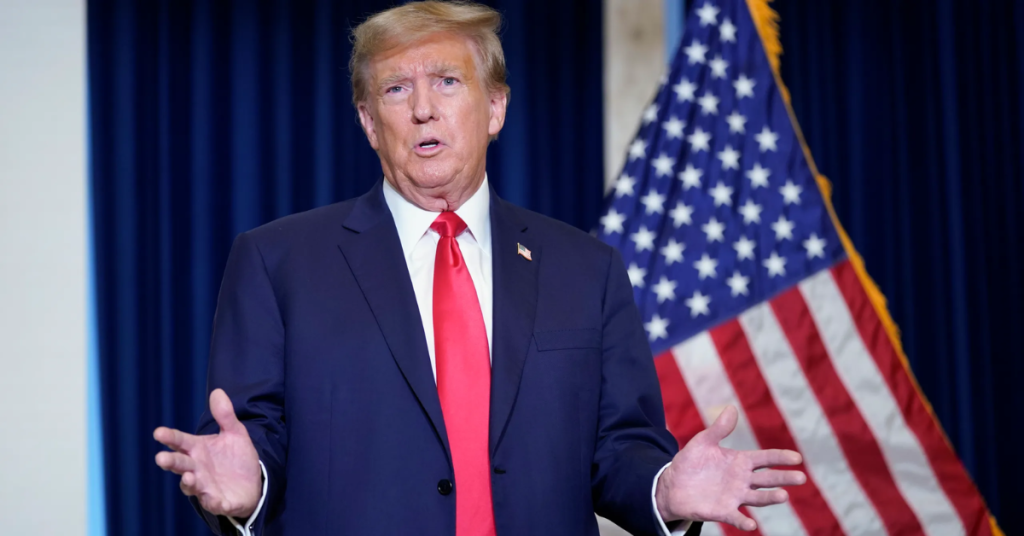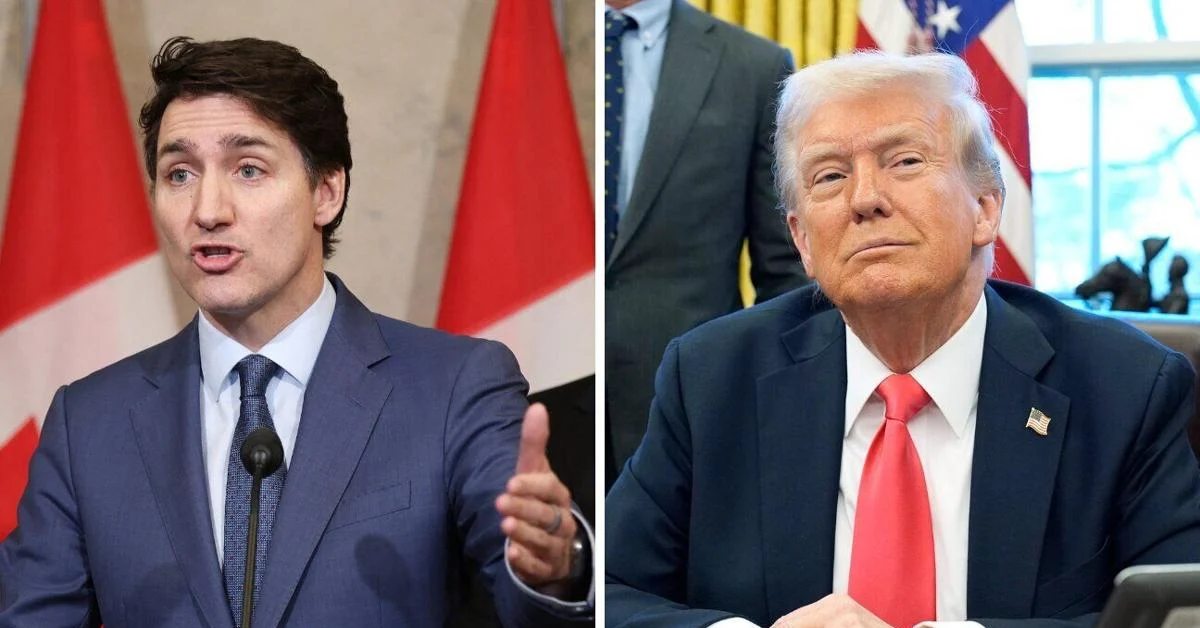U.S. President Donald Trump has sparked a wave of controversy with his latest comments regarding Canada, just days before the country’s federal election. Speaking from the Oval Office on Wednesday afternoon, Trump made remarks that suggested Canada might work better as a state of the United States. These comments came after more than a week of silence on the topic from Trump, and his bold statements have reignited discussions about the relationship between the U.S. and Canada.
Trump’s Bold Claims Before Canada’s Federal Election
Trump’s remarks were not just a casual comment but part of a broader narrative he has previously shared, where he claims that the U.S. heavily “subsidises” Canada to the tune of $200 billion every year. In his latest statement, he emphasised the benefits of Canada being a U.S. state.
“I have to admit, as a state, it works great,” Trump said, referring to the strong economic ties between the two nations. He added that 95% of Canada’s transactions are with the U.S., which, in his view, makes the two countries highly interdependent.
Trump’s statement further suggested that without U.S. trade, Canada “would cease to exist,” and he claimed to have had a past conversation with Prime Minister Justin Trudeau in which he made the same assertion.
Trump even went so far as to refer to Trudeau as “Governor Trudeau,” further implying that he viewed Canada more as a U.S. state rather than a sovereign country. While he maintained that it would be “inappropriate” to comment on the Canadian election, his remarks were made at a time when Canadian political discourse was shifting focus, prompting renewed attention on the Canada-U.S. relationship.
The Election Impact: Divisive Political Reactions
Canada’s federal election is quickly approaching, and the political race has heated up. The battle between Conservative Leader Pierre Poilievre and Liberal Leader Mark Carney is intense, with both leaders vying for the top spot. Trump’s comments have only added to the already tense political climate, with leaders across the country voicing their reactions.
Liberal Leader Mark Carney responded during a speech in Victoria, calling for strong national leadership. “A united nation needs real leadership at this time. We need to come together so we can fight President Trump together,” Carney said, urging Canadians to stand united in the face of foreign interference. He emphasised that he had only spoken with Trump once, during a phone call in March, and that the conversation was respectful; however, he noted that the U.S. president’s recent remarks were out of line.
Carney’s response also included criticism of Conservative Leader Pierre Poilievre, accusing him of endorsing “American-style” policies, particularly on issues related to homelessness, housing, and mental health.

Poilievre, who has focused his campaign on reducing the cost of living and limiting government intervention, has remained relatively quiet on Trump’s comments. However, his party’s focus on aligning with conservative U.S. policies has raised concerns among those who fear that such approaches could lead to more economic inequality and increased government interference.
With the election campaign nearing its end, the focus of Canadian voters has shifted. According to a poll by CBC’s Vote Compass, economic issues and the rising cost of living have overtaken foreign policy concerns in the minds of voters.
Before the debates, relations between Canada and the U.S. were a top issue. However, as election day draws closer, voters are increasingly concerned about their pocketbooks, with the cost of housing and inflation emerging as key points of debate.
NDP Leader Jagmeet Singh, meanwhile, expressed his own concerns about Trump’s remarks. During a campaign stop in Winnipeg, Singh criticised the U.S. president’s suggestion of increased tariffs on key Canadian exports.
Singh called the idea of additional tariffs “devastating news” for Canadian workers and urged the Canadian government to take further action to protect jobs and support those who might be negatively impacted by potential economic fallout. He also suggested that the government should expand Employment Insurance to help those who may be affected by the trade tensions.
Concerns over Trade: A Potential Economic Crisis
Trump’s comments have raised alarm about the potential for a renewed trade conflict between the U.S. and Canada. One of the key issues discussed by Trump was the possibility of increasing tariffs on Canadian exports, including aluminium, steel, auto parts, and softwood lumber. When asked whether tariffs would increase, Trump hinted that they “could go up” but did not provide specifics on the timing or extent.
This latest round of tariff talk echoes past statements Trump has made about Canada’s trade practices, particularly regarding the trade deficit. Trump once again reiterated his claim that the U.S. “subsidises” Canada to the tune of $200 billion, a figure that has been widely criticized by trade experts and debunked as misleading.
In fact, trade data show that Canada’s trade deficit with the U.S. in 2024 was approximately $63 billion, indicating that Canada imports more from the U.S. than it exports. However, this is not equivalent to a “subsidy,” as Trump has repeatedly suggested.
In response to previous U.S. tariffs, Canada implemented its retaliatory measures, placing tariffs on $60 billion worth of U.S. goods, including items used in the automotive industry. Canada also introduced policies, such as expanding Employment Insurance, to help businesses and workers affected by the trade disputes. These measures have played a role in easing the economic strain caused by the tariffs but have also contributed to rising tensions between the two countries.
Trump’s suggestion that Canada does not need U.S. oil, lumber, or cars has been a source of ongoing frustration in Canada. His remarks have only amplified the tensions between the two nations and further complicated the political landscape in Canada as the election approaches.
What’s Next for Canada-U.S. Relations?
As the Canadian federal election draws to a close, Trump’s comments have reignited discussions about the future of the Canada-U.S. relationship. With the tight race between Poilievre and Carney, the election’s outcome is likely to have a significant impact on Canada’s approach to dealing with the U.S.
Trump’s remarks serve as a reminder that foreign policy issues, particularly trade and international relations, continue to play a central role in shaping the political landscape. However, as economic issues take center stage in the election, it remains to be seen how Canadians will respond to these external pressures and how the political landscape will shift after election day.
Disclaimer: This article has been meticulously fact-checked by our team to ensure accuracy and uphold transparency. We strive to deliver trustworthy and dependable content to our readers.


